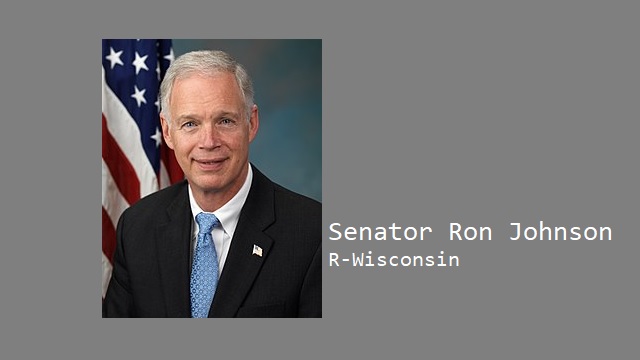Senator calls for ‘special commission to investigate and report on allegations of irregularities before the Electoral College vote is certified.’

Senator Ron Johnson, R-Wisconsin, has called for a “special commission to investigate and report on allegations of irregularities” before certifying the Electoral College vote.
There will be a Congressional debate on the outcome of the 2020 election on January 6th.
Two presidential elections in a row, a large portion of the public hasn't accepted the result.
This is not a sustainable state of affairs.
I support a special commission to investigate and report on allegations of irregularities before the Electoral College vote is certified.
— Senator Ron Johnson (@SenRonJohnson) January 3, 2021
NEW: A coalition of GOP senators and senators-elect, led by @tedcruz, will object to the Jan. 6 certification of the presidential election results Unless there is an emergency 10-day audit of the results by an electoral commission.https://t.co/fC2u5D45O2
— Adam Shaw (@AdamShawNY) January 2, 2021
Right now, according to EveryLegalVote.com President Trump leads Joe Biden by 18 electoral college votes. There are seven states where lawsuits, recounts, forensic audits and legislative actions are still pending. These states are: Arizona, Georgia, Michigan, Nevada, Pennsylvania, Virginia and Wisconsin.
Some of these states may add votes to the Trump column. There is still a slim chance that the U.S. Supreme Court may get a second bite at the 2020 Election apple from one or more of the pending lawsuits from these states, like Georgia.
In addition, The Amistad Project has filed litigation in several key swing states arguing that illegal conduct by state and local officials led to more than 1.2 million potentially fraudulent ballots, including illegal votes that were counted and legal votes that were not counted. In each state, the number of potentially fraudulent ballots far exceeds the margin separating the leading presidential candidate.
The Bottom Line
The Amistad Project issued a research paper on the deadlines set for the electoral college titled “Set In Stone? — A Historical, Constitutional, and Legal examination of Electoral College Deadlines and their implications for the 2020 Presidential Election.”
The authoritative Amistad Project research paper breaks down the history of Electoral College deadlines and makes clear that this election’s December 8 and December 14 deadlines for the selection of Electors, the assembly of the Electoral College, and the tallying of its votes, respectively, are not only elements of of a 72-year old federal statute with zero Constitutional basis, but are also actively preventing the states from fulfilling their constitutional — and ethical — obligation to hold free and fair elections. Experts believe that the primary basis for these dates was to provide enough time to affect the presidential transition of power, a concern which is fully obsolete in the age of internet and air travel.
The white paper also shows that the December 8 “safe harbor” deadline for appointing presidential Electors does not apply to states where flagrant violations of state election laws affected the outcome of the popular vote.
In fact, the only Constitutionally-set date in the election process is the assumption of office by the President on January 20.
The 12th Amendment to the U.S. Constitution
If either Trump or Biden achieve the magic 270 number of electoral college votes then that man becomes the president.
However, if neither Trump or Biden get to the 270 electoral college votes then the determination of the election goes to Congress for a vote. The 12th Amendment of Constitution of United States of America 1789 (rev. 1992) states:
The person having the greatest Number of votes for President, shall be the President, if such number be a majority of the whole number of Electors appointed; and if no person have such majority, then from the persons having the highest numbers not exceeding three on the list of those voted for as President, the House of Representatives shall choose immediately, by ballot, the President. But in choosing the President, the votes shall be taken by states, the representation from each state having one vote; a quorum for this purpose shall consist of a member or members from two-thirds of the states, and a majority of all the states shall be necessary to a choice.
There is a possibility given the number of lawsuits, recounts and legislative actions that are pending that neither candidate gets to the magic 270 majority of the “whole number of Electors appointed” or the Electoral College is not convened to cast their votes by January 19th, 2021.
Conclusion
In simple terms here are the only four possible outcomes:
- Joseph Robinette (Joe) Biden Jr. gets 270 electoral college votes and becomes president.
- Donald J. Trump gets 270 electoral college votes and becomes president for a second term.
- Neither candidate gets a majority of electoral college votes.
- If #3 occurs then the U.S. Congress will meet and vote on who would become president.
This would be a historic moment. This would be a moment when, given all of the turmoil, the final decision on electing the president would end up in the United States Congress.
Every American, on both sides of the political aisle, is waiting with bated breath to see what the final outcome is.
Stay tuned for the joint meeting of Congress on January 6, 2021.
©Dr. Rich Swier. All rights reserved.
RELATED ARTICLES:
More than 400 Ex-intelligence Officers to Investigate Election Irregularities
Pence Welcomes Efforts by Lawmakers to Object to Electoral College Votes on Jan. 6
Here’s the List of GOP Senators Who Will Oppose Electoral College Results


Leave a Reply
Want to join the discussion?Feel free to contribute!